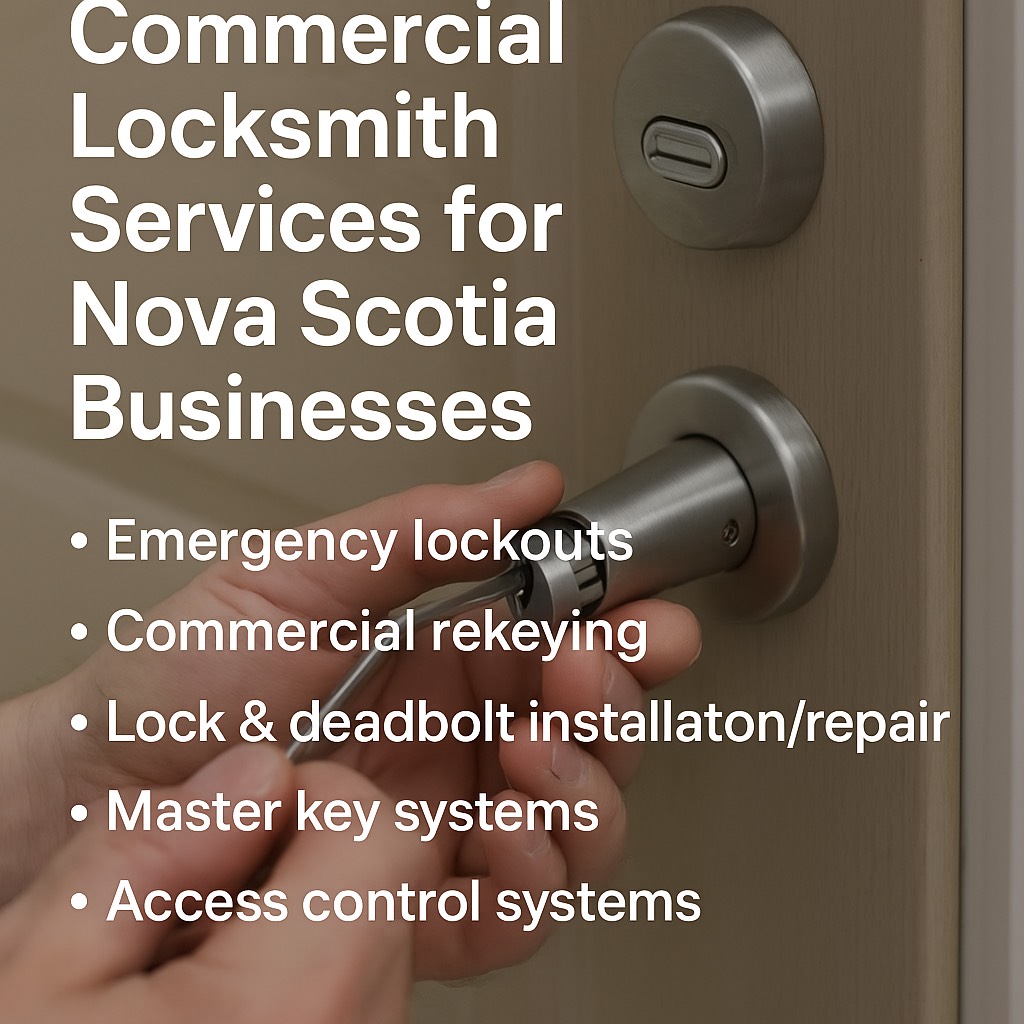Emergency lockouts • Commercial rekeying • Lock & deadbolt installation/repair • Master key systems • Access control systems
Running an apartment complex, office, retail plaza, or industrial site in HRM is a juggling act. Keys go missing, tenants turn over, doors take a beating, and you’re expected to keep people safe and keep operations moving. This guide explains the core commercial services we deliver every week across Halifax, Dartmouth, Bedford, Lower Sackville—and within a ~2-hour radius—so you can choose the right fix fast and stay compliant with Canadian life-safety codes.
1) Emergency Business & Building Lockouts
When you’re locked out of a storefront, server room, mechanical room, or unit, we use non-destructive entry methods first (picks, bypass, decoding). We verify authority on site and protect exit hardware so egress remains safe after we leave.
Pro tip: Add a low-cost keypad or fob on high-risk doors to reduce repeat lockouts and avoid unsafe “spare key” habits.
2) Commercial Rekeying (the fastest way to restore security)
Rekeying changes which keys operate your existing locks—ideal after staff changes, contractor access, lost/stolen keys, or tenant turnover. We:
- Audit which doors/people should be on which keys
- Re-pin cylinders and cut new keys
- Retire old keys (they won’t work anymore)
- Update your key log and authorization list
For tighter control, move to a restricted keyway (keys can only be duplicated by authorized signers). A simple Key Control Plan—who may request keys, how you issue/track/recall them—dramatically reduces risk and cost over time. Canadian guidance explicitly defines restricted keyways and outlines key-control procedures you can adapt for your site.
3) Lock & Deadbolt Installation and Repair
Exterior commercial doors deserve Grade 1 hardware and a 1” throw deadbolt (on doors where deadbolts are permitted) to resist prying and tool attacks. Regular maintenance (strike alignment, hinge wear, closers) prevents latch-by-pass and door damage. Provincial guidance and police crime-prevention tips consistently recommend solid deadbolts, monitored alarms, and good lighting as foundational measures for businesses.
When we install/repair hardware, we also check:
- Door/frame condition and reinforcement
- Fire-rated assemblies and labeling (don’t void ratings)
- Closer speed & latch timing (for security and ADA-style usability)
- Exit device (panic bar) operation on egress routes
Key code principle in Canada: doors on egress routes must be openable without a key, tool, or special knowledge. We’ll flag any non-compliant condition we see and provide options.
4) Master Key Systems (MK) that grow with your property
A well-designed master key system gives different people different access—without handing everyone “the big key.”
Typical hierarchy
- Change Keys (CK): One door/one user group (e.g., Unit 204)
- Sub-Masters (SMK): A floor, wing, or department
- Master (MK): An entire building
- Grand Master (GMK): Multiple buildings/campuses
We map your current and future door count, create a numbering scheme, and build in “room to grow” so expansions don’t force a re-do. Pair it with restricted, serialized keys and a simple issue/return policy to maintain integrity over years—not months. Canadian key-control best practice supports record-keeping and regular key audits to maintain security.
5) Access Control Systems (cards • fobs • mobile)
If you need time-based access (e.g., weekdays 7am–7pm), audit trails, instant card revocation, or multi-site management, electronic access is the right tool. Typical door kit:
- Reader (card/fob/mobile)
- Controller (on-prem or cloud)
- Electrified lock (strike, maglock, or mortise)
- Door position switch & REX (request-to-exit)
- Power & panel integration (often to fire alarm)
Life-safety compliance in Canada:
- Egress must release immediately on fire alarm and on power loss.
- Magnetic locks normally require a local release (egress hardware or sensor) and signage; specific provisions exist in code for where/how they’re allowed.
- Your Authority Having Jurisdiction (AHJ) may expect pull-stations, signage (“EMERGENCY EXIT UNLOCKED BY FIRE ALARM”), and emergency lighting at maglocked exits.
We design and install to meet the National Building Code / National Fire Code and local interpretations.
Quick chooser: Which solution fits your situation?
- Lost key / staff change: Rekey now → move to restricted keys + key log
- Tenants turnover often: Master key system with restricted keys
- Unauthorized duplication is a problem: Restricted keyway + strict issue/return policy
- Need time schedules & audit trails: Access control (cloud-managed for multi-site)
- Doors hard to open or don’t latch: Hardware repair first (closer/hinges/strike), then upgrade locks as needed
- After-hours lockouts: Add keypad/fob on the door with timed access
Property & Resident Manager Checklist (12 points)
- Maintain a key issue log with signatures and due-back dates
- Use restricted keys for exterior/common doors
- Rekey after turnover or lost keys
- Inspect doors monthly (latching, closer, weatherstripping)
- Confirm exit devices open freely from the inside
- Keep glass areas lit; aim cameras at entrances & cash points
- Post alarm signage; test monitoring quarterly
- Avoid “hidden keys”—move to PIN/fob where practical
- For maglocked exits: verify release on fire alarm & power loss
- Keep spare cylinders keyed and ready for fast swaps
- Train staff on the lockout process and who to call
- Review the checklist each quarter (tie it to your safety walk)
These measures align with local police crime-prevention guidance for Halifax businesses and basic provincial recommendations on deadbolts/alarms.
Why businesses in HRM choose us
- Local expertise: We work daily with property managers, resident managers, and facility teams across Halifax, Dartmouth, Bedford, and Lower Sackville.
- Code-aware installs: We design for security and safe egress, referencing Canadian codes and local AHJ expectations on every access-controlled opening.
- Key control that actually works: We help you implement a practical Key Control Plan with restricted keys and simple forms/logs.
FAQs
Do magnetic locks violate fire code?
No—when designed correctly. In Canada, maglocks on egress must release on fire alarm and power loss, and usually require local release hardware and signage. Your AHJ may have specific details; we design and document to meet them.
Should I rekey after every tenant or staff change?
If a key is unaccounted for, rekeying is the fastest risk-reduction step. Pair it with restricted keys and a key log to prevent recurring costs.
What’s the difference between master keys and restricted keys?
Master keys define who can open what. Restricted keys control who can copy keys. Most commercial sites need both for real security.
Can access control integrate with alarms?
Yes—many systems release locks on fire alarm and can share status signals. Integration must follow Canadian code/ULC practices; we coordinate with your fire/alarm vendors.
How to get started (simple plan)
- Free walk-through: We map doors, risks, compliance needs
- Options & priorities: Low-cost fixes first, then upgrades with ROI
- Implementation: Rekey or hardware today, access control in phases
- Key control kit: Issuance forms, log templates, and staff briefing
👉 Call or email to book a site survey. Same-week appointments across HRM; extended trips by arrangement.
Ready to secure your building?
Call Atlantic Locksmith (24/7) or visit our shop at 798 Main St., Dartmouth for commercial rekeys, access control, and compliant door hardware.
For immediate assistance: 📞 (902) 434-5625
information: 🌐 atlanticlocksmith.ca 📧 Info@atlanticlocksmith.ca
Visit our location: 📍 798 Main Street, Dartmouth, NS
Your security is our priority. Your satisfaction is our guarantee.
Please visit our Services Page Here – atlanticlocksmith.ca/services


